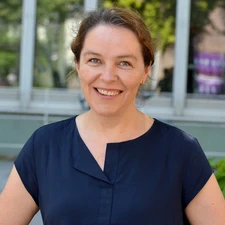Tatiana Ilyina

The 2025 Fridtjof Nansen Medal is awarded to Tatiana Ilyina for distinguished research in oceanography to enhance our understanding of the ocean carbon cycle and its critical role in the climate system.
Tatiana Ilyina has made fundamental, original, and transformative contributions to ocean science, specifically in the area of the ocean carbon cycle, climate, and climate-carbon cycle feedbacks and will undoubtedly continue to do so in the future. Ilyina has done ground-breaking work in building and using Earth System Models to understand the relationship between ocean biogeochemistry and the global climate. She has led critical studies on ocean carbon uptake, deoxygenation, productivity, land-ocean coupling, and marine carbon dioxide removal. In addition, she has been a leader in the area of decadal prediction using Earth System Models for the global carbon cycle, demonstrating conclusively that it is possible to make useful predictions. The most impressive feature of this has been in the prediction of the carbon cycle from seasonal through decadal timescales, enabling the scientific community to investigate the immediate response of the carbon cycle to emission reductions and to guide policy.
To support her scientific objectives Ilyina has, since 2010, been leading the development of the HAMMOC model, one of the most advanced and widely used models of ocean biogeochemistry.
Ilyina has developed tools for the early detection of ocean acidification effects on marine calcification and has worked on the effects of ocean chemistry changes on ocean acoustics and was able to publish the results in the prestigious journal Nature Geoscience.
Ilyina’s scientific leadership extends beyond cutting-edge science papers. She was a contributing author of Chapter 5 of the Sixth Assessment Report of the Intergovernmental Panel on Climate Change (IPCC). She is heavily involved in international science coordination as past co-chair of the World Climate Research Programme (WCRP) Grand Challenge on Carbon Feedbacks in the Climate System, and current co-chair of both the WCRP Working Group on Coupled Modeling (WGCM) and the WCRP-endorsed Coupled Climate Carbon Cycle Model (C4MIP) project. She also sits on the WCRP Decadal Climate Prediction Project (DCPP) panel.
